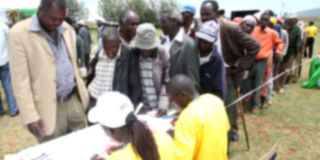Foreign factors shape Kenya's referendum

Kenyans queue to register for new voters cards. The new constitution, the US and UK say, is part of reforms that would guarantee political stability in Kenya. However, the western powers on Sunday maintained that the final decision was in the hands of Kenyan voters. Photo/ FILE
The deep involvement of foreign powers in Kenya’s constitution-making process is causing an acrimonious debate, with questions being asked whether it is good for the national interest.
Foreign influence — and money — has been brought to bear both on those opposing and those supporting the draft constitution, which will be voted on at the August 4 referendum.
The United States, the United Kingdom, and the European Union have declared their support for the proposed laws and are playing a key role in the on-going civic education.
Right wing groups
American evangelical churches and other right wing groups are reportedly funding the Reds campaign to reject the proposed constitution. Prominent among these groups is the American Center for Law and Justice, founded by right-wing evangelical Christian leader Pat Robertson.
Mr Jay Sekulow, the centre’s chief counsel, told the Nation in May that his organisation was supplying “tens of thousands of dollars” to leaders of the ‘No’ campaign. The group is opposed to the clause that allows termination of pregnancy if in the opinion of a healthworker, the mother’s life is in danger. They are also opposed to kadhi courts.
The new constitution, the US and UK say, is part of reforms that would guarantee political stability in Kenya. However, the western powers on Sunday maintained that the final decision was in the hands of Kenyan voters. “It is a Kenyan referendum and it is for Kenyans to decide,” Ms Katya Thomas, the US embassy information officer said.
Ms Charley Williams of the British High Commission said they had been careful to avoid being accused of involvement in the constitution making process. “We have to be very careful. It is a Kenyan political process,” she said.
The “Yes” and “No” camps have accused each other of using foreign money to influence the outcome of the referendum. “The UK has been very clear that it is not for us or other partners to tell Kenyans how to vote on the draft constitution. That is a decision for Kenyans alone.
It is a decision on a Kenyan document that is part of the Kenyan political process and is of course the result of 20 years of effort and deliberation by Kenyans in Kenya to produce a modern framework that best provides for and protects Kenya’s citizens,’’ she said.
She went on, ‘‘We remain however strong supporters of Kenyan efforts to implement the Agenda Four reforms of which the constitutional review was identified as a critical element. It must not be forgotten that these reforms were identified to tackle the underlying causes of the post election violence and to help ensure there is no repeat of those traumatic events.
As part of this we have provided practical assistance to the constitutional review process. Our support, alongside other donors and government, has provided technical help and expertise to the Committee of Experts and over $1 million of funding for their civic education.’’
At the weekend, President Kibaki aimed a salvo at the “No” camp over the matter. “If you receive money from foreigners to preach in your country against the document, what good are you doing to your country?” he said during a “Yes” rally at Kinoru stadium in Meru.
‘No’ camp leader William Ruto says foreign envoys were raising funds for the ‘Yes’ team. Singling out the US, he said: “Our friends in the US are so busy spending American taxpayers’ money to push for provisions which they cannot allow in their own country. This is unacceptable and they should keep off.”
The US embassy on Sunday denied the claim, describing it as “ridiculous”. “It is absolutely ridiculous and irresponsible. We are extremely upset because there is no truth in the allegations,” Ms Thomas said.


